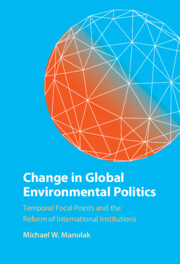 Change in Global Environmental Politics
Change in Global Environmental Politics Book contents
- Change in Global Environmental Politics
- Change in Global Environmental Politics
- Copyright page
- Dedication
- Contents
- Figures and Tables
- Acknowledgments
- Abbreviations
- 1 Introduction
- 2 It’s About Time
- 3 The Stockholm Conference and Institutional Change
- 4 UNEP and the 1982 Nairobi Conference
- 5 The Brundtland Commission and the Seeds of Change
- 6 The Rio Conference and Institutional Change
- 7 Post-UNCED UN Environmental Institutions
- 8 Conclusion
- Bibliography
- Index
8 - Conclusion
Published online by Cambridge University Press: 12 May 2022
- Change in Global Environmental Politics
- Change in Global Environmental Politics
- Copyright page
- Dedication
- Contents
- Figures and Tables
- Acknowledgments
- Abbreviations
- 1 Introduction
- 2 It’s About Time
- 3 The Stockholm Conference and Institutional Change
- 4 UNEP and the 1982 Nairobi Conference
- 5 The Brundtland Commission and the Seeds of Change
- 6 The Rio Conference and Institutional Change
- 7 Post-UNCED UN Environmental Institutions
- 8 Conclusion
- Bibliography
- Index
Summary
The conclusion summarizes and discusses the principal findings of the book, highlighting the role of temporal coordination dilemmas and Temporal Focal Points in patterns of continuity and change in international institutions. After relating these findings to other theoretical approaches, the chapter discusses the theoretical implications of the analysis contained in this book for the study of change in international institutions. The chapter provides an extended discussion of policy implications, including how international actors can employ the logic of temporal coordination in modernizing global institutions in the current international setting. It concludes with an analysis of the current context in global environmental and sustainable development politics, analyzing progress in combatting global challenges, such as climate change and the loss of biodiversity, and implementing the Sustainable Development Goals (SDGs). It argues that the international community has incentives to realize institutional change and that a Temporal Focal Point could soon emerge.
Keywords
- Type
- Chapter
- Information
- Change in Global Environmental PoliticsTemporal Focal Points and the Reform of International Institutions, pp. 233 - 259Publisher: Cambridge University PressPrint publication year: 2022
